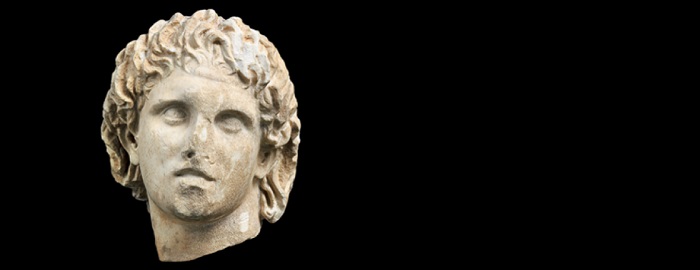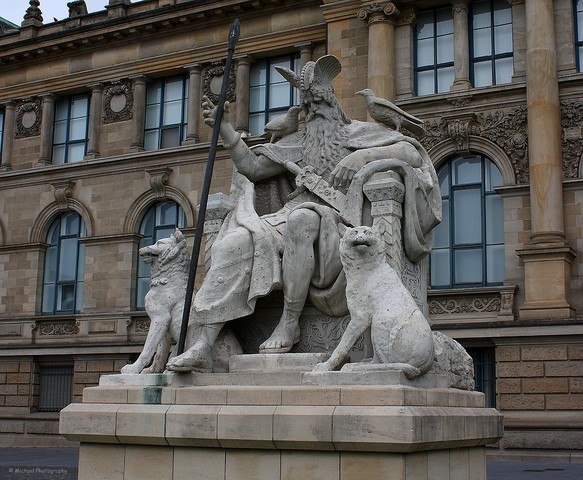
In 323 BCE, one of the most powerful men in recorded history died of fever in Babylon. It's been argued that he was poisoned, drank himself to death, or was abducted by aliens but this is the official story agreed upon by most academics and for our purposes here, it's the one we're going with. But even before the body of Alexander the Great went cold his generals began carving up his vast empire, the largest that the world had ever seen. In fact, to many, it WAS the world. Ptolemy took Egypt and a long line of "Ptolemaic" Pharaohs would follow, Cleopatra included, while Seleucus took the eastern lands (present day Iraq, Iran, Afghanistan, and Pakistan) founding the Seleucid Empire. The rest of the known world was split between 3 other generals, all 5 of them Macedonian rulers.
![division-of-alexanders-empire.jpg]
( )
)
This, of course, would be a problem. The legitimacy of Alexander's reign was won at the point of a spear, and while these new rulers were his generals, they were not Alexander. To many, even to the man himself, Alexander was a god. He survived campaign after campaign, throwing himself into the midst of battle and he always came out the victor. After he defeated Darius to become the ruler of Persia he was formally declared a god and given all such honors back in Greece. He was invincible, but now he was dead, and his generals were foreigners ruling over broken empires and peoples. Had it not been for the sheer magnitude of the personality and accomplishments of the man who won the lands they now bickered over, they would have been deposed immediately... but these were the Generals of Alexander.
In the years after his death, the "Cult of Alexander" persisted and the concept of the Hellenistic Ruler Cult, connecting kings to the gods began to flourish much as it had in Egypt. Ptolemy, being the General of a god, found it fairly easy to become Pharaoh of Egypt, thus becoming a god himself, as did the other rulers. This idea of a ruler cult continued far into the medieval period, with the kings of Europe speaking not only for their people but often for God himself. Many of them would even refer to themselves in the plural as "We" meaning: God and I.
And so it is, that from time to time throughout history we find individuals who've become so accomplished and loved in life that the stories told about them years after they've died become legends, myths, and then, sometimes, religions as is the case with Alexander. There are even stories of Roman emperors secretly worshiping him as one of their pantheon of gods hundreds of years later.
With deification so prevalent in the ancient world, it makes you wonder about all the other characters that were worshiped and how they became gods. Not the myths, but the real stories behind the names of Zeus, Apollo, Ra, and Horus. Was Odin such a powerful norse warrior-king in prehistory, such a beast on the battlefield, that he became a god to his people after he left this world? Was Hercules such a strong man that history will forever remember his feats of strength, exaggerated as they've become over time? Were the tales of dragons found all around the world the imaginings of people who discovered dinosaur bones and had no real concept of the vastness of time? Were the ancient stories of ogres the distant memories of a people who once lived alongside the neanderthal, many times stronger than a man and a dangerous animal to cross?

The obvious exaggerations of history can be found everywhere and to someone well-versed in the subject it can be hard to completely write off the various myths and legends we find as pure fiction when so many of them can be traced back far enough where you can see the stories becoming more and more mundane with each previous telling. You see, the people who record histories and sagas are rarely liars, but often bullshitters, and there's a clear difference. A liar will knowingly tell you an untruth, while a bullshitter will inadvertently tell you one because it sounds plausible and helps to fill in a gap in their knowledge of a subject or story. Sometimes we even find that entire lines and stanzas are added to bardic songs and poems to complete a rhyme or to properly fill in the timings of the musical accompaniment.
Imagine if our only source of information on Julius Caesar was from Shakespeare's play by the same name. Quite a few liberties were taken with the real history for dramatic effect, brevity in some cases, and verbosity in others. The bardic songs and stories that were passed from generation to generation before the advent of writing codified them and ended their evolution some 7000 years ago could be FAR older than we realize. For all we know, the only truth about the man named "Thor" that remains in the stories told about him was that he carried a hammer. He's a god and a comic book character now, but perhaps in the year 11,000BCE he was the chief of a powerful tribe of raiders and conquerors and after he died, his legend began. 4-6000 years later his story was committed to stone for the first time and if you've ever played "telephone" as a child, you know that's far too long for much fact to remain in what's become a fictional story about a real man.
Now ask yourself this. Keeping with the questions posed above, could a middle-aged nazarene carpenter by the name of Yeshua ben Yosef have been able to break down Hebrew society and morality with nothing but his own words and a few followers, and become such a threat to the priests and their monopoly on thought and culture that they had him tried and executed? Could a cult have formed around him and his followers much the same as Alexander?
Hi! I am a robot. I just upvoted you! I found similar content that readers might be interested in:
https://medium.com/refuse-to-cooperate/deification-and-the-exaggeration-of-history-ad4c6337945a
Downvoting a post can decrease pending rewards and make it less visible. Common reasons:
Submit